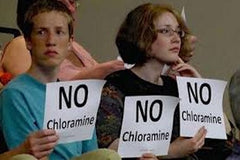Have you ever thought about how water ends up in your glass and what's happened to it?
While it's great that most of Canada isn't using recycled water, our tap water undergoes chemical processes so that it stays safe to drink. Most people probably never question what's in their tap water and don't know about all the chemicals, chemical byproducts and heavy metals...
And You Thought Chlorine Was Bad...
After inquiring into the drinking water in Victoria, BC, we received the following information: "The water is disinfected using ultraviolet light followed by the addition of chlorine and then ammonia. In the water, these latter two substances combine to produce chloramines, this has the advantage of being very long lasting (i.e. a residual amount of chlorine provides continuing disinfection even out to the extremities of the distribution system), lower production of disinfection byproducts such as trihalomethanes and haloacetic acids and lower perception of chlorinous tastes and odour.”
They are mixing Ammonia into the Chlorinated water and the chemical reaction produces Chloramines.
Chloramine, like chlorine, is toxic to fish and cannot be used in aquarium water. If you already have an aquarium, then you know that you have to treat water with a dechlorinator to remove either chlorine or chloramine, or the water will kill their fish.
In hydroponic applications chloramines has been shown to impede the growth and production of plants. When watering the plants with chlorinated water, the majority of the chlorine evaporates after about 8 hours, but the chloramine takes days to evaporate.
Do we really want this chemical to be in our bodies all the time killing all the friendly bacteria in our intestines?! Obviously, it's not necessary as the majority of Canada doesn't use it.
NOTE: Regular carbon filtration methods are ineffective on the ammonia component of chloramine. You specifically need a water filter for Chloramine.
IT GETS WORSE
Chloramines Increase Heavy Metal Exposure
Chloramines increase heavy metal exposure, due to the ammonia present in the compound causing corrosion of copper and lead pipes. In areas with older housing and public water systems that still use copper or lead piping, this exposure can result in dangerous levels of lead and/or copper in the bloodstream of those who drink the water.
When your drinking water contains ammonia the nitrate levels increase. Nitrates are known carcinogens (recently linked with Autism) and they make the oxygen level in the blood drop.
Both chlorine and chloramine have to be removed by special carbon filtration before water can be used for dialysis, because both compounds will destroy red blood cells. This contamination of water may be why some people have unexplained chronic anemia (a lack of red blood cells usually attributed to iron deficiency).
Chlorine/Chloramines Linked To Birth Defects
The most common reaction byproduct associated with chlorine is trihalomethane (THM), which has been linked to early miscarriage and birth defects. Many communities are now seeking alternative ways of treating their water.
Chloramine is worse when it is inhaled in gaseous form.
Swimmers, did you know that respiratory issues due to chloramine exposure is common among competitive swimmers, as is eye and skin irritation? Moms, do you know how toxic it is to take your little baby to the pool? Even if a swimming pool is not directly treated with chloramine, it will be formed by the reaction of free chlorine with organic substances found occurring in the water.
For your bathroom at home, you can get a refillable shower filter which removes 95% of chlorine & chloramines. You'll enjoy showers without the chemical smell and your skin and hair will be less dry. The ceramic FIR filtration reduces surface friction and gives the water a lighter, softer feel. It improves wetness and transforms coarse, dry hair to soft and silky. (We recommend Organic Shampoo/Conditioner from Aubrey's Organics :)

Victoria and Abbotsford in BC, Edmonton and some smaller cities in Alberta and Saskatchewan, and Ottawa and some of its surrounding communities are known to use chloramine. Also, Longeuil in Quebec. Please post if you know of other locations affected by this chemical.
Resource: http://nutristart.com/does-your-water-contain-chloramine/


